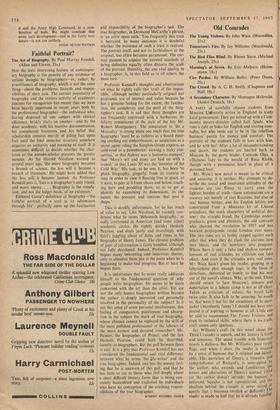In her first novel, The Cactus Land, Mrs. Stern looked
at apartheid through the eyes of a young African girl. This time her hero is a young. English South African, Sebastian, whose Boer fiancee deserts him in favour of her nationalist principles. He is drawn towards liberal opinion, by the example of his sister, by his friendship with a Jewess who is taken off for ninety days' detention, and by his involvement with the Brandts, a German immigrant couple who inad- vertently fall foul of the police by sending their children for a holiday in a kraal with their black nanny. The characters may be at times over- drawn, and' the dialogue corny, but the dialectic is presented subtly through, not on top of, the fiction. Fascism is smoked out of its lair and properly abused. Mrs. Stern has only to be more wary of the clichés of fashionable romance and her next novel will be a good one.
Situations which are tackled with the superb efficiency and aplomb to be expected from two such brilliant agents as Adam Breck and Tiani, the entertainment value is high indeed. Exciting and extremely plausible.
Last Drop. By Belton Cobb. (W. H. Allen, 15s.) A tiny triangle, of torn nylon isn't much, but in the hands of a trained investigator who asks a seemingly unimportant question it means a lot, for the answer he is given changes, the whole situation. Absorbing. A quietly convincing story is Alias His Wife. By Stephen Ransome. (Gol- lancz, I6s.) To receive a sealed but empty enve- lope for nine consecutive days, and then on the tenth to receive an anonymous and frightening note is the commencement of a tense and strained time for deputy prosecutor Ross Quarent and his wife. Suspected blackmail and a murder follow. Double Fault. By Laurence Meynell. (Crime Club, 15s.) In the social setting of the Abbey Chase tennis weekend, most of the house guests had good reason to hate the pro,
THE CITY
Investment Notes
By CUSTOS .TMHE gilt-edged market has at last come into its its own. As I have lately been emphasising its improved status and prospects and hoping Mat investors would jump on its bandwagon. I am naturally more than gratified. As I pointed out, the classical position had been reached when a switch from equity shares to govern- ment bonds seemed bound to pay off. A higher yield was being offered on bonds than on equities at a time when. Mr. Callaghan's deflationary measures made it certain that no further rise in equity profits and dividends could generally be expected. The take-off in the gilt-edged market occurred sonic three or four weeks ago when selling . dried up and buyers appeared in more strength.-In the last two weeks, rises of 'tip to four points were seen, and on Friday, geptenther 10 when the •news of the fresh sup- port for the £ was announced, the market really boomed. The boom was checked when the disap- pointing trade figures appeared. However, the gains over the last Sew weeks have been remark- able. War Loan has come up from 513 on August 3 to 56 and the long-dated Treasury 51 per cent 2008-12 from 821 to 87i. It is small wonder that the new ICI 7f per cent Loan Stock, issued at 98f, opened up at 41 and rose to 4i premium.
Equity Shares
Although a classical position had been reached when a switch from equity shares 'cum deflation' into government bonds 'cum reflation' was likely to prove right, I am not suggesting for one moment that equity shares have or should be sold. The movement into 'gilts' was largely -out of short money on deposit. The investor should confine any selling of equities to shares where a dividend cut under the Callaghan squeeze seems inevitable. And he should pick up at the same time shares of companies where the management is outstanding and where the in- dustry is still expanding under Mr. George Brown's Economic Plan. (I recently gave some examples —COPE ALLMAN, SHIPTON AUTOMATION and CARRINGTON DEWHURST.) II is not wise to be short of shares (or bonds) when the market situation is changing rapidly for the better. Not






























 Previous page
Previous page